Dr. Paul T. P. Wong’s autobiography, A Lifelong Search for Meaning: Lessons on Virtue, Grit, and Faith, is published in weekly installments. Stay updated here.
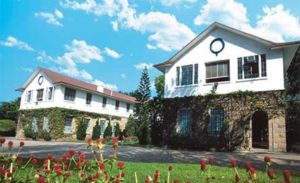
A good education is transformative. I am so grateful that Father arranged for us siblings to spend one year at the residential school of St. Stephen’s College Preparatory School. Realizing that Temple Street was not the best environment for children, he decided to enroll us at St. Stephen’s so that we could learn more English in a good and safe environment, away from the hustle and bustle of city life.
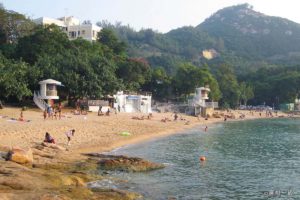
St. Stephen’s beach, now a tourist attraction.
St. Stephen’s College and the Preparatory School were located on the hills in the Stanley peninsular, surrounded by Pacific Ocean. St. Stephen’s beach was nearby. The school campus provided a perfect environment for students to be in intimate communion with nature if they so desired. It was a refreshing new experience for me to discover and enjoy the natural beauty of Hong Kong.
Looking back, the year at St. Stephen’s was indeed a time of awakening—emotionally, intellectually, and spiritually—during my formative years. My world was suddenly opened and I became aware of what I was made of and all the possibilities ahead of me.
Boys Will Always be Boys
This was the first time that us three boys—Constant, Giles and myself—were away from home. I felt responsible for taking care of my two younger brothers in a new environment. I was ready to defend them against anyone who dared bully them, knowing full well that we would be the targets for teasing and bullying because of our language deficiency.
We had to overcome two language barriers—English and Cantonese. All English subjects were taught by White teachers; all other subjects were taught in Cantonese. Most of our classmates were also Cantonese. At first, they teased us and mocked us because we spoke Mandarin by calling us lou hing (老兄), but such teasing soon stopped once I established a reputation for being a “tough guy” in spite of my small stature.
At that time, I was quite confident that I was able to take on any bully, having prepared myself for combat. Intuitively, I knew that, to take care of myself in a strange land, I needed to have some skills in self-defence. Since our arrival in Hong Kong, I had secretly trained myself to develop an iron fist. Whenever I had the opportunity, I would practice hitting my right fist against a wall until I was able to endure the pain of punching a hard surface.
My assumption was that an average person would not be able to take a punch from me. Therefore, my opening line for any potential bully was: “Do you want to try my iron fist?” It did not take long before I established a reputation at St. Stephen’s of having the hardest fist. Some classmates referred my fist as a turtle shell. This reputation ensured that my two younger brothers were free from any bullying.
Another way of reinforcing my reputation of being a “tough” guy was through weekly wrestling matches at night. We simply pushed two beds together as the platform for wrestling. Anyone could challenge anyone. Whoever got pinned down was declared the loser. Even though I was small and skinny, I was quick and strong. I was surprised that I was even able to defeat classmates much taller and bigger than me. According to my own analysis, I won all the matches because I used my intelligence and speed rather than muscle and brute strength. This holds true for all kinds of battles. Life is competitive sport; each one of us needs to know our strengths and weaknesses.
However, in team sports such as baseball and basketball, I was hopelessly inept to the point that my classmates could barely tolerate me being a member of their team. I simply did not have the skills in these ball games. Nevertheless, I still enjoyed being part of a team and playing in the wide, open field.
Awakening to the Beauty of the British Poetry
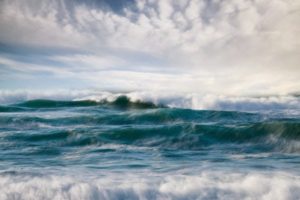
Sea Fever, photo by David Baker.
We did not have any English lessons in China. We began to learn the alphabet only after arriving in Hong Kong. Honestly, I could not understand what was being said by the teacher in our English classes. Despite this severe language handicap, the natural beauty of British poetry still came through as I learned to recite them for class assignments.
My favourite poem was “Sea Fever” by John Masefield. Even many years after I left St. Stephen’s, I could still recite the whole poem by heart.
I must go down to the seas again, to the lonely sea and the sky,
And all I ask is a tall ship and a star to steer her by;
And the wheel’s kick and the wind’s song and the white sail’s shaking,
And a grey mist on the sea’s face, and a grey dawn breaking.
I must go down to the seas again, for the call of the running tide
Is a wild call and a clear call that may not be denied;
And all I ask is a windy day with the white clouds flying,
And the flung spray and the blown spume, and the sea-gulls crying.
As I surveyed the ocean around me and recited the poem, it stirred inside my spirit for adventure, which continued all through my high school years. It also filled my heart with a deep sense of joy and awe in experiencing the wonders and beauty of being in the bosom of Mother Nature.
Another favorite poem of mine was William Wordsworth’s “My Heart Leaps Up”:
My heart leaps up when I behold
A rainbow in the sky:
So was it when my life began;
So is it now I am a man;
So be it when I shall grow old,
Or let me die!
The Child is father of the Man;
And I could wish my days to be
Bound each to each by natural piety.
This poem not only moved me deeply by its beauty and rhythms, but also made me keenly aware of the transient nature of life and the prospect of aging and dying. Although limited in my understanding as a child, I could still experience some comfort and relief from death anxiety by feeling connected with nature. My childlike delight in nature taught me the wisdom that aging and dying were just like the ebb and tide of the ocean and the endless cycle of sunrise and sunset. At a deeper level, our union with nature means that we are all waves of the same ocean and clouds of the same sky.
My brief exposure to British poetry made me realize for the first time my love for pure literature and ignited in me a spark of aspiration to be a writer one day. Since my St. Stephen’s days, I have continued to read and write English poetry. I find poetry an ideal vehicle to express my deeply felt sentiments about the big issues of human existence. Here is one of the poems I wrote about the meaning of life and death many years ago, entitled “I Weep for You”:
I do not weep for the fallen leaves,
Nor do I mourn the buried petals,
For the trees and flowers will flourish again
When Spring wakes up the planet earth.
But I do weep for you, my fellow human beings,
For your wasted years and squandered lives
In all your indulgence in shallow pleasures
And all your self-inflicted pains and sorrows.
My Spiritual Awakening
As St. Stephens was founded by the Church Mission Society, it was only natural that we were exposed to some Christian influence at St. Stephen’s. Surprisingly, it was not the preaching or the teaching but the music that had a lasting impact on me.
I can vividly recall that one bright afternoon, a British missionary, a big white woman, taught us a Christian song with actions. While walking back and forth, she taught us to sing “Walking with Jesus.” Then, she divided the students into two groups and taught us to sing in rounds. The overlapping songs created very interesting harmony and dynamics.
Walking with Jesus
Walking everyday
All along the way
Walking with Jesus
Walking with Jesus along…
Walking in the sunrise
Walking in the shadow
Walking everyday
All along the way
I had no idea who Jesus was, but the idea of walking with someone day and night gave me an intuitive sense of emotional security. I even sang this song to myself when I walked through the cemetery. If such childlike belief can give us such a sense of peace and security, why not teach children good Christian music?
Another hymn that has stayed with me all through these years is Howard Walter’s “I Would be True”
I would be true, for there are those who trust me;
I would be pure, for there are those who care;
I would be strong, for there is much to suffer;
I would be brave, for there is much to dare.
It is such a simple and powerful song about courage and ethical personal responsibility. This song would spontaneously appear in my mind during moments of temptations and fears. It has become the moral foundation in my life. There is no theology, no moral philosophy in this hymn, just a simple relational appeal to be faithful and strong so that we would not let down those who trust us and depend on us. It is a matter of personal responsibility and personal honour.
I could not wrap my head around the concept of the Trinity or the incarnation at that time, but the life story of Jesus was a compelling one to me. It was indeed very moving and inspiring to give one’s life for all sinners so that they could be moved by his sacrificial love to change their way of life and gain God’s acceptance. My positive view of Christianity at the school sowed the seed for my eventual conversion years down the road.
My First Crush
In a child’s eyes, my mother was not only the best mom, but also the most beautiful woman. At that time, I did not have any criteria or standard for female beauty, but Mother was almost perfect from any angle. Even though Mother was not the cuddly type, I was still very much devoted and attached to her. I would do anything to make her happy.
Other than my mother, I had no interest in females, even after my first lesson of sex education from one of my roommates in St. Stephen. The biology and mechanics of sex was revealing but not highly arousing. I was quite content to continue my usual role of being a teacher’s pet.
For some reason unknown to me, I remember that all my teachers in primary school gave me special treatment. I not only got 100% plus 10 for most of my assignments, but was often singled out for praise. Miss Lam was my grade six teacher at St. Stephen’s. She too showed me special favour by inviting me to her room and treating me with snacks, or asking me to get involved in special projects for the class.
She was a petite woman with big eyes. She had a soft but effective way of teaching. I did not feel particularly proud of being the top student in the class, because the first semester repeated much of what I had already learned in China. What I did not know that I was also the best in English and the arts. She really appreciated my drawings; I worked with her closely to design and paint the background for our school play. Because of my frequent interactions with her, over the years, I imperceptivity developed a crush for her. I did not know what was happening to me, but I do know that I was heartbroken and cried myself to sleep when I learned of her subsequent marriage after my graduation.
Ten years later, a student from St. Stephen’s unexpectedly visited me. He introduced himself and said that he really wanted to meet me, because Miss Lam told the students what a special student I was. I was deeply grateful that she still remembered me after ten years.
Stanley Military Cemetery: Did They Die in Vain?
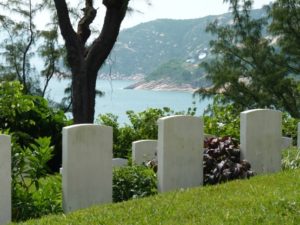
Stanley Military Cemetery, situated on the hillside above and behind the beach.
The Stanley Cemetery, located near St. Stephen’s, was well kept as a war memorial. When I walked through the cemetery, I noticed many of the makeshift headstones for the fallen Canadian soldiers. I wondered why these young men came all the way to Hong Kong just to die in a futile battle. I also wondered how many of these young recruits signed up for the chance of a better life or for the noble cause of defending freedom and democracy.
I was so intrigued by the cemetery that I must have visited it several times, even though I had nightmares of being haunted by the ghosts of murdered soldiers and civilians in Stanley. Based on this experience, I wrote my first English poem on death; it expressed my lamentation regarding the brevity of life and the young fallen soldiers who had never really lived. I believe that the seed of my lifelong interest in death studies was sown in those days of living close to a cemetery.
Since I am now a Canadian citizen, I have taken a special interest in Canada’s role in the tragic Battle of Hong Kong. I have learned that the Canadian contingent was known as the “C” Force. They arrived in Hong Kong on November 16, 1941, without their full equipment and without adequate training. Many of them were killed in their first action of World War II on December 11, less than a month after arrival.
Even more tragically, on the morning of December 25, 1941, Japanese soldiers massacred a large number of unarmed, wounded soldiers along with the medical staff in the British field hospital at St. Stephen’s College. In the afternoon of the same day, known as the Black Christmas, the Colonial government of Hong Kong surrendered to the invading Japanese army. The Hong Kong garrison, without adequate air support and navy defense, and without sufficient ground troops, could only hold out for 17 days.
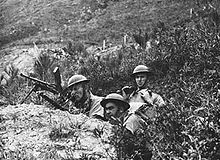
Inexperienced Canadian soldiers in Stanley.
According to war historian Tim Cook’s The Necessary War, the Battle of Hong Kong was the only Canadian battle with 100 percent casualties: 292 dead with the remainder wounded or taken prisoner. Another 267 Canadians would die in the POW camps due to disease, starvation, physical abuse, or execution.
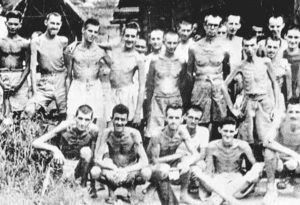
These Canadian POWs remind me of the Holocaust.
Of all the human evils, none is as horrible as the war between nations or within a nation. I dream of peace in Hong Kong and peace in the Taiwan Strait. I dream of peace in the Middle East and peace in Africa. I dream of a peaceful world for all the young people and children who can grow up and fulfill their lives’ potentials.
Alas, when will we learn from the horrors and futility of all the past wars? When will political leaders come to their senses that there are no winners in any prolonged warfare? Why can’t people settle conflicts through rational, peaceful means? Let us celebrate life above power, territory, nationalism, or ideology. Let us live and let live on this beautiful planet in peace! Let us join our forces to eliminate armed conflicts.
I want to conclude this chapter with Peter Gabriel’s lyric in “Fourteen Black Paintings”:
From the pain come the dream
From the dream come the vision
From the vision come the people
From the people come the power
From this power come the change

 Meaning Conference 2025 will be the INPM’s first in-person conference with a virtual option after the pandemic.
Meaning Conference 2025 will be the INPM’s first in-person conference with a virtual option after the pandemic.